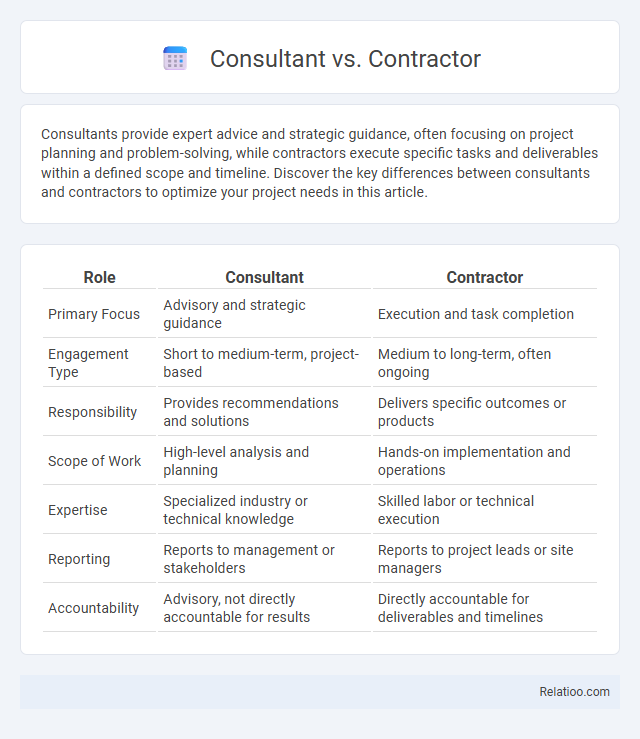Consultants provide expert advice and strategic guidance, often focusing on project planning and problem-solving, while contractors execute specific tasks and deliverables within a defined scope and timeline. Discover the key differences between consultants and contractors to optimize your project needs in this article.
Table of Comparison
| Role | Consultant | Contractor |
|---|---|---|
| Primary Focus | Advisory and strategic guidance | Execution and task completion |
| Engagement Type | Short to medium-term, project-based | Medium to long-term, often ongoing |
| Responsibility | Provides recommendations and solutions | Delivers specific outcomes or products |
| Scope of Work | High-level analysis and planning | Hands-on implementation and operations |
| Expertise | Specialized industry or technical knowledge | Skilled labor or technical execution |
| Reporting | Reports to management or stakeholders | Reports to project leads or site managers |
| Accountability | Advisory, not directly accountable for results | Directly accountable for deliverables and timelines |
Definition of Consultant and Contractor
A consultant is a specialist who provides expert advice and strategic guidance to organizations on specific projects or business challenges without being a full-time employee. A contractor, on the other hand, is hired to perform specific tasks or services under a defined contract, often involving tangible deliverables or project completion. Understanding the differences between your consultant and contractor roles helps optimize project outcomes and ensures clear expectations in your business engagements.
Key Differences Between Consultants and Contractors
Consultants typically offer expert advice and strategic guidance on specific projects, whereas contractors provide hands-on services and complete tasks according to agreed terms. Your choice between a consultant and a contractor depends on whether you need specialized recommendations or direct labor execution. Key differences include the nature of work, duration of engagement, and the level of control over how tasks are performed.
Roles and Responsibilities
Consultants provide expert advice and strategic guidance to organizations, focusing on problem-solving and delivering specialized knowledge without direct involvement in daily operations. Contractors execute specific projects or tasks under a defined contract, managing resources and timelines to achieve tangible outcomes while operating independently from the client's regular staff. Duties represent the specific obligations and responsibilities assigned to individuals based on their role, outlining expected performance, accountability, and compliance within contractual or organizational frameworks.
Engagement and Hiring Process
Consultants typically undergo a project-based engagement with defined deliverables, often hired through a proposal or bidding process emphasizing expertise and outcomes. Contractors are usually engaged via contracts specifying labor or services over a set period, with hiring processes centered on qualifications, compliance, and scope of work. Duty of care during hiring ensures both consultants and contractors meet legal, safety, and performance standards to mitigate risks and protect organizational interests.
Payment Structures and Compensation
Consultants typically receive fixed fees or hourly rates based on deliverables, offering predictable payment structures aligned with project scope. Contractors are often paid hourly or on a per-project basis, with compensation tied to labor and time spent, which can fluctuate depending on workload and contract terms. Your choice between consultant, contractor, or duty roles impacts tax obligations and benefits eligibility, influencing overall compensation and financial planning.
Legal and Tax Implications
Understanding the legal and tax implications of Consultants, Contractors, and Duties is essential for your business compliance and financial planning. Consultants typically provide expert advice under service contracts without direct payroll taxes, whereas Contractors are often engaged under employment or project-based agreements subject to withholding taxes and labor laws. Differentiating between these roles determines your liabilities for social security contributions, VAT registration, and adherence to specific regulatory obligations tied to each classification.
Duration and Scope of Work
Consultants typically engage in short-term projects with a clearly defined scope of work aimed at providing expert advice or solutions. Contractors often have a longer duration commitment, executing specific tasks or projects under a contractual obligation with detailed deliverables. Your understanding of duty varies by role; consultants advise and recommend, while contractors perform hands-on work aligned with project requirements.
Skills and Expertise Required
Consultants need specialized skills in analysis, strategy, and problem-solving to provide expert advice tailored to business challenges. Contractors must possess technical expertise and hands-on experience to execute specific projects or tasks efficiently within a defined scope. Your choice depends on whether you require strategic guidance, practical implementation, or a combination of skills aligned with the particular duties of the role.
Pros and Cons for Businesses
Consultants offer specialized expertise and strategic insights, allowing your business to tackle complex projects without long-term commitments, but they often come at a higher hourly rate and limited control over daily operations. Contractors provide flexibility and cost-effective labor for specific tasks, yet they may lack deep organizational knowledge and continuity beyond the contract duration. Duty refers to the legal and financial responsibilities your business holds, ensuring compliance and risk management, but meeting these obligations can increase operational costs and administrative burden.
Choosing Between a Consultant and a Contractor
Choosing between a consultant and a contractor depends on project scope, expertise required, and long-term goals. Consultants provide strategic advice and specialized knowledge without direct involvement in daily operations, ideal for guiding decisions and improving processes. Contractors execute specific tasks or projects with defined deliverables, offering hands-on support and implementation within a set timeframe.

Infographic: Consultant vs Contractor
 relatioo.com
relatioo.com